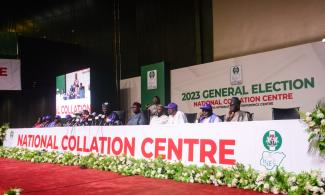The Think-Tank for Democracy (T-TD), a pro-democracy civic group, has decried the recent call and agitations for an interim government in the country.
Some candidates who lost the 2023 general elections and their supporters had been agitating for the interim government, hinging their demand on the reported malpractices recorded during the presidential election which was won by the All Progressives Congress standard bearer, Bola Tinubu.
Sequel to the protests and alleged inflammatory statements by the proponents of the interim government, the Department of State Services alerted the nation to a plot by unnamed politicians to scuttle the transition and install an interim government.
The secret police said it was monitoring the plotters and warned them against fomenting any crisis in the country.
In a statement by its chairman, Professor Lucky Akaruese and secretary, Professor Sylvester Odion Akhaine, the pro-democracy group condemned the widespread violence and electoral irregularities that accompanied the elections.
It added that many of those who are parading themselves around as politicians and groupthink leaders and threatening the democracy without regard to the rule of law did not play any role during the bloody democratic struggle.
Rather, many of them were military apologists at the time, the statement added.
The statement read, “It would be recalled that Nigeria’s fourth republic was inaugurated on May 29, 1999, after a protracted struggle against military rule. The road to May 29 was paved with sorrow, tears, and blood of our compatriots who desired democracy as a critical element of good governance. Our struggle for a government based on popular sovereignty only resulted in what transitologists call a ‘pacted transition’ that disenfranchised a broad segment of the Nigerian people and imposed two major candidates from a region of the country as an act of brinkmanship. Recall that on June 12, 1993, a free and fair election was won by Chief M.K.O. Abiola and was blatantly annulled by the military regime of General Ibrahim Babangida in a transition that participants and observers alike had called ‘Endless Transition’ or ‘Transition without End’.
“It should be noted that since 1999 we have gone through seven general elections, and each cycle resulted in some form of improvement in the mechanism of elections despite attempts by politicians to subvert the process. It is to the merit of the ongoing democratic process that the judiciary has managed to resolve post-election contradictions in ways that have stabilized the democratic process—room for contestation and reform of the Electoral Act in our quest to improve the process. Here in lies the optimism that democracy offers.
“The recently concluded 2023 general elections have unleashed worrisome currents. The elections were underlined by electoral problems that are not new to our landscape and have been central to electoral reforms in our bid to overcome them and bring transparency to bear on the quality of our democracy. They include killings, snatching of ballot boxes, intimidation of voters, vote-buying, and tampering with results. While these blighted the merit of the process, they by no means surpass previous electoral malfeasance. That said, we like to advert to a most dangerous outcrop of the last electoral cycle—the identity factor. We know that our country is one of many nationalities/peoples that are territorially segregated and linguistically diverse. The over-dramatisation of identity politics of the ethnic hue will only lead us to the road to Kigali. There are distinct class questions such as poverty which has no ethnic boundary that should border us. We must as much as possible drift away from ethnic politics for its toxicity and inclination to violence.
“Despite the above discontents of the process, somehow, actors at play have won some forms of victory. The leading opposition parties won some elective positions other than the presidency. To be sure, there are noticeable positive developments in the process that we should run with and further transform. One of them is the magic of the Bimodal Voter Accreditation System (BVAS) to the effect that it negates every act of over-voting and moderates the inclination towards over-voting and outright manufacture of election results. This should be deepened to allow real-time declaration of results which is the point at the issue of those aggrieved with the just concluded process. The massive interest shown by the younger segment of our voting population is tonic for our democracy, and this must be canalized into concrete formations to harvest future opportunities. The path of political wisdom dictates the embrace of the remedial mechanisms that the organic law of the land provides to address disputations arising from the electoral process.
“The call for an interim government has gained attraction following the outcome of the 2023 election. But unbeknown to many it has been on the agenda of many anti-democratic elements in the polity to truncate the current democratic process. Truly, a segment of the pipers of the interim government contraption feels the need to resolve the national question before proceeding further in our democratic march in ways that clear, once and for all, the bottlenecks to our democratic growth and national development. Chief Afe Babalola and Pa Adebanjo possibly belong to this school of thought. Other proponents of the interim contraption are doing so in other to ambush our democracy. It’s regrettable that after over two decades of democracy, the country is still grappling with basic democratic principles which if not properly handled and effectively checked, have the potential to set us back into the dark days of military dictatorship. Unfortunately, many of those who are today, parading themselves around as politicians and groupthink leaders and threatening our nascent democracy without regard to the rule of law did not play any role during our bloody democratic struggle. Rather, many of them were military apologists at the time.”
